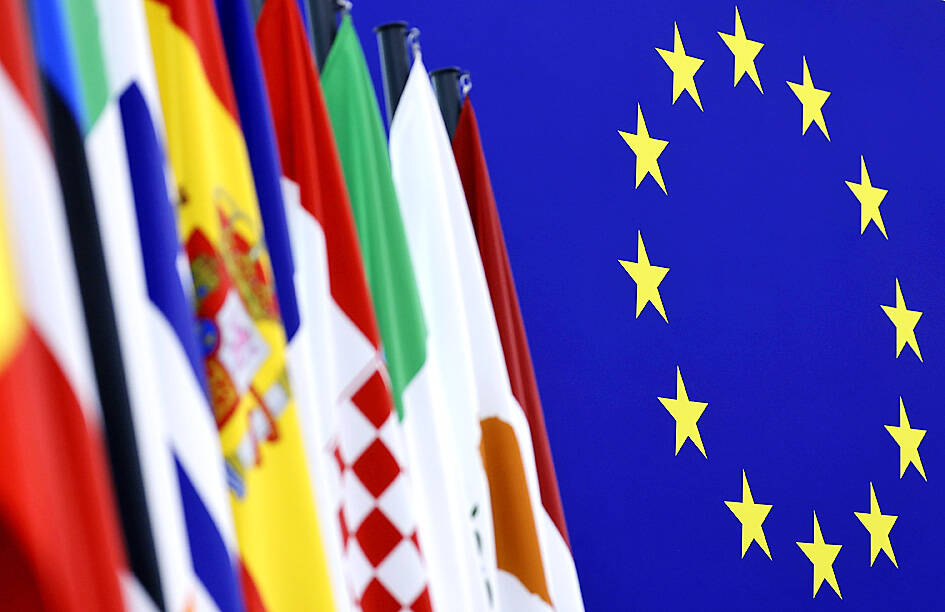The European Union will raise concerns with the US over a decision to restrict the export of artificial intelligence (AI) chips from the likes of Nvidia Corp to some of its member states, according to people familiar with the matter.
In one of its last moves in office, former US president Joe Biden’s administration introduced a three-tier system to curb sales of AI chips used in data centers. The US placed Poland and a number of its allies in the EU’s east in the second-tier category of countries that face limits to the amount of computing power they can purchase.
The goal of the measures, which companies such as Nvidia and Oracle Corp have warned could be catastrophic for the US tech industry, is to ensure that the global development of AI aligns with American standards and relies on US technology.

Photo: Ronald Wittek, EPA-EFE
The rules split the globe into a group of close US allies including western European nations as well as Canada, Japan and the UK, which won’t face serious restrictions. The second category that will involve caps on AI chip imports covers most of the world, while the third group involves adversaries such as China and Russia, which are effectively barred from buying the powerful semiconductors.
The move goes against the EU’s single market by treating member states differently, said the people, who spoke on condition of anonymity to discuss private discussions. It would also hinder innovation in the bloc’s east and unfairly favor western European companies, one of the people said.
Polish Minister of Digital Affairs Krzysztof Gawkowski said the White House’s decision was “incomprehensible and is not based on any substantive reasons.” Foreign ministers from Latvia, Estonia and Lithuania said in a joint statement that it undermines “the development of our national AI eco-systems.”
Although US President Donald Trump made little specific mention of Europe in his inaugural address, he has repeatedly threatened tariffs and the bloc is bracing for the worst.
If attempts to engage with the new US administration on alternatives such as a common approach to China fail, the EU has already prepared lists of goods to target if Trump moves forward with tariffs.

Macronix International Co (旺宏), the world’s biggest NOR flash memory supplier, yesterday said it would spend NT$22 billion (US$699.1 million) on capacity expansion this year to increase its production of mid-to-low-density memory chips as the world’s major memorychip suppliers are phasing out the market. The company said its planned capital expenditures are about 11 times higher than the NT$1.8 billion it spent on new facilities and equipment last year. A majority of this year’s outlay would be allocated to step up capacity of multi-level cell (MLC) NAND flash memory chips, which are used in embedded multimedia cards (eMMC), a managed

In Italy’s storied gold-making hubs, jewelers are reworking their designs to trim gold content as they race to blunt the effect of record prices and appeal to shoppers watching their budgets. Gold prices hit a record high on Thursday, surging near US$5,600 an ounce, more than double a year ago as geopolitical concerns and jitters over trade pushed investors toward the safe-haven asset. The rally is putting undue pressure on small artisans as they face mounting demands from customers, including international brands, to produce cheaper items, from signature pieces to wedding rings, according to interviews with four independent jewelers in Italy’s main

CULPRITS: Factors that affected the slip included falling global crude oil prices, wait-and-see consumer attitudes due to US tariffs and a different Lunar New Year holiday schedule Taiwan’s retail sales ended a nine-year growth streak last year, slipping 0.2 percent from a year earlier as uncertainty over US tariff policies affected demand for durable goods, data released on Friday by the Ministry of Economic Affairs showed. Last year’s retail sales totaled NT$4.84 trillion (US$153.27 billion), down about NT$9.5 billion, or 0.2 percent, from 2024. Despite the decline, the figure was still the second-highest annual sales total on record. Ministry statistics department deputy head Chen Yu-fang (陳玉芳) said sales of cars, motorcycles and related products, which accounted for 17.4 percent of total retail rales last year, fell NT$68.1 billion, or

In the wake of strong global demand for AI applications, Taiwan’s export-oriented economy accelerated with the composite index of economic indicators flashing the first “red” light in December for one year, indicating the economy is in booming mode, the National Development Council (NDC) said yesterday. Moreover, the index of leading indicators, which gauges the potential state of the economy over the next six months, also moved higher in December amid growing optimism over the outlook, the NDC said. In December, the index of economic indicators rose one point from a month earlier to 38, at the lower end of the “red” light.